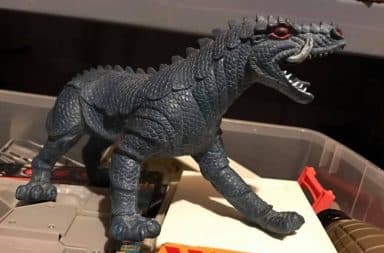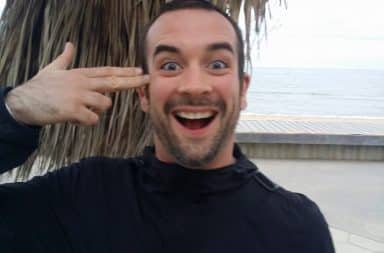Like everybody, stress gets to me. Recently, I moved twice, quit two jobs, started a new one, and a bunch of other shit. Korea isn't known for its relaxing areas, but I really needed to chill out. I, like the mighty Samsung Galaxy S2 (or Android, as some people call it), am not dead; I just need to recharge my batteries for a few hours. I decided to visit one of the many Buddhist temples in order to relieve myself of the stresses of the city of Seoul, and just see something beside the inside of different bars and clubs.
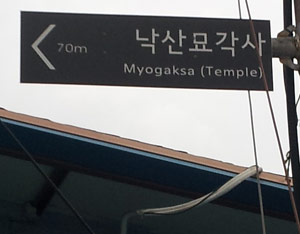 I researched online for about ten minutes and found the closest temple I could find. For about $50 you can live like a Buddhist monk. At this time, I lived in my university's dorm, so I already lived an incredibly celibate and boring life. But why not pay to do it? I found Myogaksa, one of Korea's oldest temples, in a relatively nearby area of Seoul.
I researched online for about ten minutes and found the closest temple I could find. For about $50 you can live like a Buddhist monk. At this time, I lived in my university's dorm, so I already lived an incredibly celibate and boring life. But why not pay to do it? I found Myogaksa, one of Korea's oldest temples, in a relatively nearby area of Seoul.
The trip took quite a while. I live a little outside of Seoul, and Myogaksa required me to take three different subway trains. I'm constantly visiting different drinking spots all over the place, but this time I wanted to culture myself and see something new. And that takes some effort.
When I arrived at the area, I wasn't really sure I was at the right spot. It was just so, um, urban. I thought temples all sat at the top of mountains in the middle of nowhere. This neighborhood looked just like the rest of Korea: crowded. I followed some signs and landmarks, then found the spot. Many Korean temples, fortresses, and palaces look the same: really bright yellows, greens, and reds on old wood. So I shrugged my shoulders, and hopped in.

I've been to plenty of churches, Jewish temples, and other areas of worship, but something about the smell of this temple almost instantly put me at ease. I guessed it was sandalwood, even though I don't know what that is. Later I learned it was juniper wood. The incense was nice and made me feel good.
I didn't really expect to meet foreigners there, but inside were folks from Ireland, Czech Republic, Canada, Korea, and me, the lone American. In Korea, from time to time you see Buddhist monks and nuns. Sometimes they walk around, other times they ask for alms, but you see them. So I was a little more shocked to see foreigners rather than bald men and women. In my living and working area, you might see the same one or two foreigners, but only once in a while.
What really surprised me was that everybody was so happy! I've met plenty of people of faith, but everybody here, from the main nun Yeo Yeo (pronounced Yo-Yo) to the helpers and cooks, wore huge smiles, all the time. The holy people definitely made me feel at home, especially since no holy water boiled as I crossed the temple's threshold.
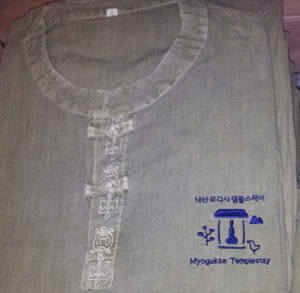
Soft and warm, it's the quiet storm.They showed me to a changing area, where I was to remove my everyday clothes and put on a sort of pajama getup, similar to a martial arts uniform. It was functional and comfortable, exactly my style. I decided to ditch my smartphone because I wanted as true as an experience as possible. Little did I know, a lot of the monks and nuns carried iPhones. They're just like regular people in that respect.
After I changed, we walked into one of the prayer rooms and did a few introductions. I needed to replace my shoes with some rubber shoes that were too small for my feet. The monks and nuns all wore Crocs, and for the first time in my life, I felt jealousy for Crocs. Thankfully, that passed as I exited a day later.
The other foreigners seemed cool. None of them were residents of Korea, just tourists, which made me the only English teacher, something that seemed to impress a lot of people a lot more than it should have. Also, which sometimes seems to be the case, not a single foreign woman looked remotely attractive, so I figured I wouldn't break anybody's vows of celibacy. Plus, banging on hardwood floors without a bed to collapse on afterward would suck.
We started off with some prayers and lessons about the Buddhist faith. Some of this I knew, some I learned for the first time. There is a real distrust of Buddhists with government. One of the monks told me, "One of the reasons for temples is to protect our religion, our culture, our people, from the outside. We have continually been persecuted by governments who want what we have." I thought this a little paranoid, then I remembered Tibet and all the Buddhist protests and stuff. So, I bought it.
Our first group activity was to ring a giant bell in the tower. I wasn't too enthused, then I saw the system. It's basically a giant log suspended from some giant ropes, and you swing the log to the bell and it's really loud. So it turned out to be exciting and relaxing at the same time, and maybe my favorite part of the trip.
Just about every Korean pronounced my name "Kay-She," but this is just a language thing. The plain letter "C" or "see" is really hard for Koreans. I got over it about five minutes after stepping foot in the country, mostly because I know I pronounce just about every Korean name wrong.
I found it pretty cool how up-to-date the monks and nuns were. They talked about current events, asked to be our Facebook friends, and like I said, some had iPhones.
Later, Yeo Yeo told us about when she was finally allowed to watch Kung Fu Panda, Lord of the Rings and Avatar, all of which amazed her, since she hadn't seen a movie in five or six years. She even managed to tie them all into Buddhist lessons. Kung Fu Panda captured the essence of "nothing"; Avatar, meditation; and LOTR, something else. There was a lot of information. Or maybe she just thought it was a cool set of movies.
One of the main things everybody mentioned when talking about the temple stay experience was the food. The Buddhists don't believe in killing animals for food, so it's all vegetarian stuff. I don't need to eat meat every day, so I dealt with it, and for the most part, I liked the food. It did some numbers on my guts, so I had a few crap attacks during meditations or cleaning chores. But going from a few veggies to only veggies will play some tricks on your insides. I was thankful for bathrooms all over the place.
One of the older monks, the spiritual guide, spoke great English and took some time to talk with us. Everybody came up with great questions, but all I could muster was, "Why is Buddha so fat in some representations, and so skinny in others?" I felt like a dipshit for asking, but I was genuinely curious. The answer: different depictions, just like different depictions of Jesus Christ. So in cultures where being fat is considered holy (like Japan), Buddha is fat. In cultures where they respect skinny, he's skinny. Also, he meditated for a long time then got skinny. After enlightenment, some folks think he got fat. Like Elvis.
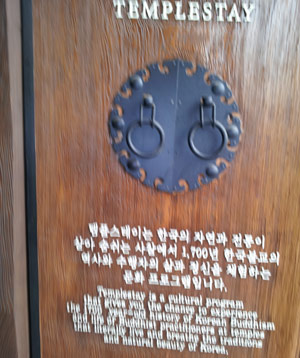 Another big thing you hear about when you talk to people who have done the temple stay is that they make 108 bows, or prostrations. Essentially, you kneel and bow, touching your forehead and hands to the ground, and then you stand up after each one. As we did this, we created a beaded necklace, kind of like a rosary. This was one of the tangible things we kept after the experience. Real monks and nuns do this a few times a day, so I didn't think it would be a big deal, but on the hard floor, it sucked. My knees and other joints crack. I'm in shape and this sucked; I can't imagine being 50, 60, or older like some of the holy people and doing this multiple times a day.
Another big thing you hear about when you talk to people who have done the temple stay is that they make 108 bows, or prostrations. Essentially, you kneel and bow, touching your forehead and hands to the ground, and then you stand up after each one. As we did this, we created a beaded necklace, kind of like a rosary. This was one of the tangible things we kept after the experience. Real monks and nuns do this a few times a day, so I didn't think it would be a big deal, but on the hard floor, it sucked. My knees and other joints crack. I'm in shape and this sucked; I can't imagine being 50, 60, or older like some of the holy people and doing this multiple times a day.
During the prostrations, you think of things you want to improve, or nothing if you can. It's really not as easy as it sounds. You get confused. After finishing, I was really glad it was over.
A few years ago, I was in a pretty bad accident. To commemorate this, and almost dying a few times, I tattooed my signature on my foot. I was terrified I was going to die and nobody would know who I was. Yeo Yeo thought my sign was the symbol for men, thinking I liked dudes. Not the truth. I happily explained. All in all, I didn't really feel any judgment from the monks or nuns for the tattoos all over my body. I don't know if that's just their thing, if they were just acting, or if they really don't care, but it was nice not having to constantly explain that I'm not an ex-con or a gangster—those are really the only folks who sport ink in Korea.
Another highlight was the 40 minutes of silent meditation. Here, you basically just sit still and try not to think. Again, really effing difficult. I thought about everything and anything. A big focus was the plot in the second and third Pirates of the Caribbean movies, but I still haven't figured them out. I remember thinking I should probably shut everything off in my life more often and just sit still, trying not to think. Then I realized I was thinking, so that fudged everything up.
We sat for another time, and I thought, "I should write a zombie story about being stuck in a Buddhist temple." So I did. You can read that here.
At the end of our time, we sat in a tea ceremony. Tea is important to Buddhists, because Buddha invented it or something. As he meditated, he realized he was falling asleep, so he tore his eyelids off and threw them in front of himself. They turned into tea flowers, so he boiled them and made green tea. Gross, yes. Weird, also yes. But not any more bizarre than the Catholic belief in Communion.
I wish I would have known how photogenic the holy people were, but I assumed no photography would be allowed. So I missed that boat. Oops.
For our sleeping arrangements, lights went out at 9 p.m. I worried about being up until my usual 1 a.m., but the long journey, light food, and lack of sleep the night before had me pretty exhausted by lights out time. The boys and girls slept in different areas, which was cool. I talked to the Czech guy, who was pretty cool. Very quiet. Maybe he was afraid of sleeping alone with a tattooed American, who knows?
I sleep pretty well just about everywhere, so the hard floor wasn't such a big deal. I wasn't cold either. I worried about bugs (Buddhists don't want you to slap mosquitoes or gnats), but I didn't see any, so no big deal.
At the end of the trip, I felt really relaxed. I did something I meant to cross off my Korean Bucket List for a while, learned some stuff, avoided the bar scene for a while, and just enjoyed the company of others instead of instant messaging, texting, and all that other crap.
Is it for everyone? Probably not, but I think anybody can grow a little if they take themselves out of their comfort zone and see how other people live.
